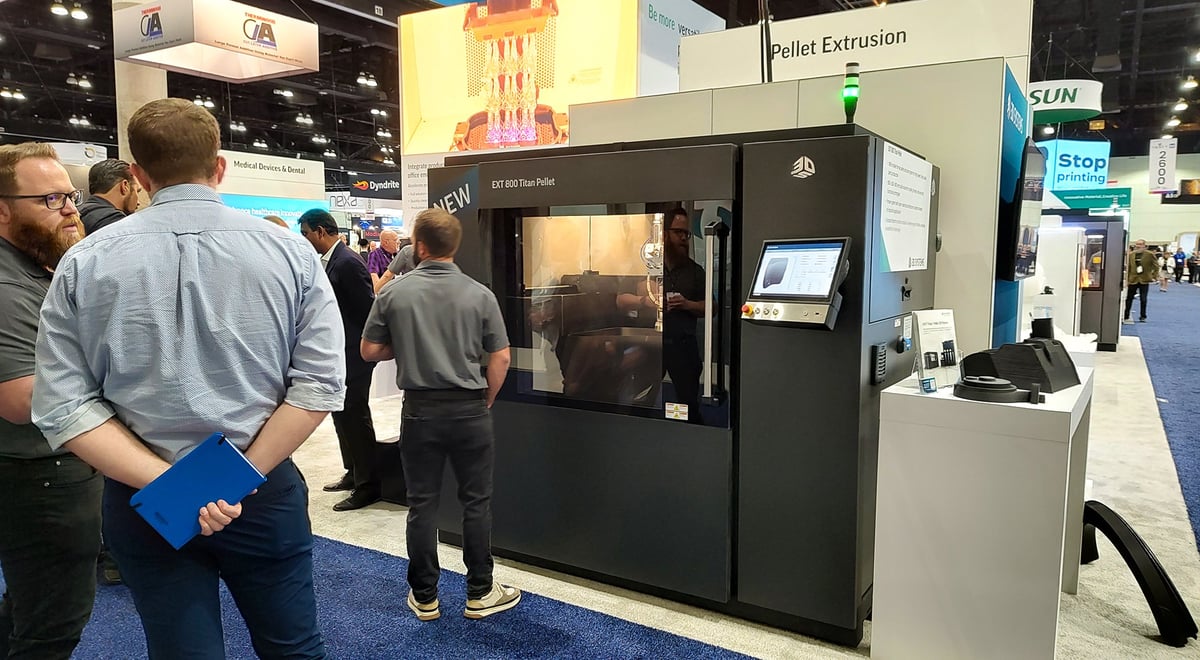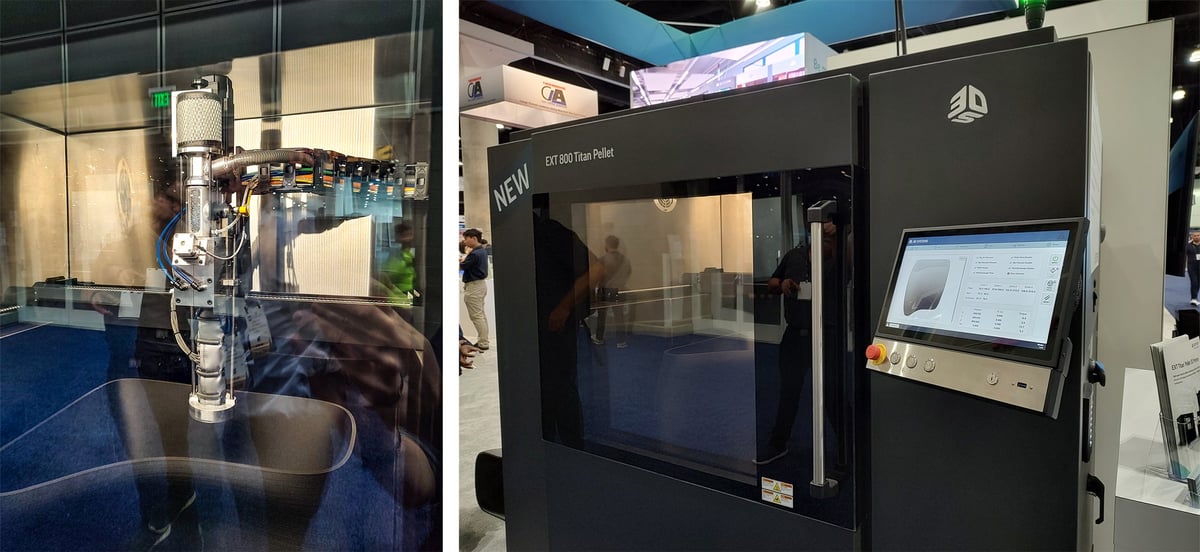The economy and speed of 3D printing with pellet materials has attracted a lot of attention over the past few years as robotic arms enable larger and larger 3D printers. Yet, pellet 3D printing offers a wide range of benefits for mid-size and even small parts.
The new Ext 800 Titan Pellet from 3D Systems is still large by polymer extrusion standards (800 x 600 x 800 mm), but is the smallest in the now three-member Titan family. It boasts 10-times the output of competing extrusion printers that use filament and up to 10-times less material costs, according to 3D Systems.

Like the two other Titan Pellet extrusion systems (Ext 1070 Titan Pellet and Ext 1270 Titan Pellet) the Ext 800 Titan Pellet is aimed at industrial production with applications from foundry patterns and manufacturing fixtures to prosthetics and durable goods.
“A lot of the time the request from customers has been; ‘Well, our parts are smaller that machine is too big to even push it to the double doors and the investment cost is higher,'” Rahul Kasat, 3D Systems VP, told All3DP at Rapid + TCT. “So we listened to our customer feedback and decided to come up with something more compact but the exact same capabilities in terms of materials, throughput, and technical specifications.”
With a welded steel frame, industrial CNC controller, servo-driven ball screws on all axes, and an actively heated (80°C) enclosed build chamber, the Ext 800 Titan Pellet is built for lights-out additive manufacturing, 3D Systems says. The large touchscreen enables access to printer functions while safety features, such as door interlocks and material feed run-out detection ensure safe operation.
“I call this as an entry-level industrial pellet machine,” says Kasat. “When you look at how do you increase the adoption of additive, you have to look at how do you bring the investment level down, how do you make sure the customers have a better experience.”
A Material for Every Application
3D Systems offers a wide materials range (20+) for the 800 from PLA and PETG to carbon-fiber nylon and PEI . There’s also specific materials for thermoforming molds, sand-casting patterns, and other common applications.
“We have come across applications where none of the materials in our portfolio meet the needs of it,” says Kasat. “So then we do custom formulations for that customer, and then help qualify that material.”
Customers can also use any common economical injection molding pellets to tune their material to their application.
Pellet extrusion also enables printing highly flexible and elastic materials including TPEs as soft as shore 26A. Research has shown that pellet printing produces comparable results to FDM with filament, and in some cases, it may even improve the mechanical characteristics, like tensile strength, because the pellet material hasn’t been processed a second time into filament.
Other features on the Ext 800 Titan Pellet include a integrated pellet material dryer, and the extrusion system is compatible with nozzles ranging from 0.6mm to 9.0mm enabling you to choose between fine layers with smooth surfaces and coarse resolution with high-throughput of up to 14 kilos per hour for draft prototyping.

What Are the Ideal Applications for the Ext 800 Titan Pellet
Although with almost unlimited polymer compatibility, the industries and applications are very broad. Current customers use the company’s pellet machines for sand casting patterns, thermoforming molds, jigs and fixtures, large prototypes, and tooling.
One emerging area Kasat mentioned was furniture. “When customers are printing larger furniture they use the larger machine, but they are also printing smaller components so they asked us for a smaller machine. They don’t want to tie up their larger machine to print smaller parts. So we have lot of existing customers who wanted to add another capability with a smaller platform.”
The Ext 800’s closest competition is perhaps the Filament Innovations’ Ares, the Industry Magnum, and a host of up-in-coming industrial pellet machines all vying for dominance in this growing niche. Yet, 3D Systems has a solid head start.
“We were one of the first ones to do pellet extrusion, we were the first one to integrate machining capability on the pellet extrusion machine, so I think we have always been at the forefront of it,” says Kasat. “There’s more work to be done. We have the largest install base of extrusion technology across the globe and we get insights from our existing customers that feeds into our R&D pipeline. So you will see more products coming from us.”
Existing customers, though, Kasat notes, will always have the ability to upgrade and retrofit their existing machines when new innovations from 3D Systems hit the market.
Ext 800 Titan Pellet Tech Specs & Price
- Technology: Extrusion. Fused Deposition Modeling (FDM) will pellet material
- Build Volume: 800 x 600 x 800 mm
- Print Speed: Up to .5m/sec
- Pellet Extruder Throughput: 0.45kg – 13.6kg per hour
- Min. Layer Height: 0.4 mm
- Max. Extruder Temp.: 400°C
- Max. Chamber Temp.: 80ºC
- Price: TBD
The Ext 800 Titan Pellet is available for immediate ordering with delivery of the first printers anticipated for the third quarter of 2024.
______________________
Never Miss Any News:
License: The text of "3D Systems Launches Smaller Pellet FDM with Big Features" by All3DP Pro is licensed under a Creative Commons Attribution 4.0 International License.

